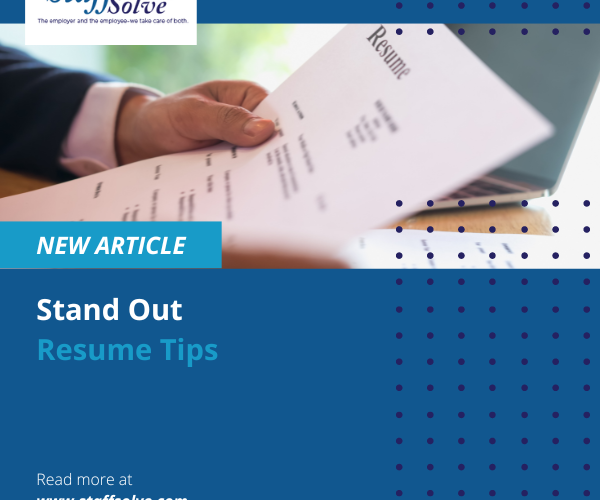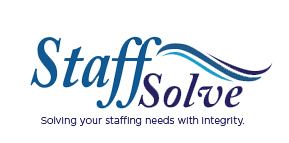
Stand Out Resume Tips
- On December 1, 2022
positions available near me
Part of landing the ideal position is having a phenomenal resume that makes you stand out compared to other applicants. Employers want to find and hire the best employees for each open position, and resumes are the first step in that search. A resume is the most important document submitted in a job search. It’s the first opportunity for job searchers to present themselves to a potential employer.
Hiring managers and recruiters look at resumes for an average of only six to seven seconds each, so it’s important that you make every second count. A strong resume can help you stand out from the crowd, but a weak resume can remove you from the running. There are several strategies job applicants can use to make their resume stand out and demonstrate that they are the best candidate for the job.
It can be difficult to compress experiences and qualifications on one page, but there are many ways to spruce up a resume without going overboard. The number one golden rule for writing a resume is to keep it short and to the point. The rule of thumb is no more than one page unless you have a very good reason for it to be longer, like an extensive career or a lot of highly applicable work experience. An easy way to keep a resume concise is to include only recent, relevant experience. While all jobs can be important to shaping your abilities in the professional world, it’s not always necessary to include every detail from your career. Most experts recommend including jobs from the previous 10 or 15 years only, although this time frame may be shorter if you are new to the workforce. Including too many unrelated work experiences can make your resume appear too busy and draw attention away from your relevant qualifications. Your resume should be focused, clear and concise.
Employers appreciate originality, and while it’s helpful to refer to a professional resume template, don’t follow it to the tiniest detail. Studies show that more than 60% of hiring managers consider a customized resume as the top strategy for job applicants to increase their chances of landing a job. Job applicants should format their resumes so that it is easy to identify their qualifications. When structuring your resume, make sure the information is presented in a logical order and include the strongest points to have your best strengths showcased.
Using the same resume for every job you apply for is not a good approach. Instead, resumes should target the specific job applicants are applying for. Be sure to prioritize the skills, qualifications and experiences that are directly applicable to the job in question. Choose three or four former positions or experiences that best highlight the skills required for the position. While employers value brevity; this is not the time to list every position ever held. If you don’t have a work history that directly relates to the job, get creative with how other experiences are presented. Draw on the skills used and how those contributions benefited the organization or project.
When writing about previous work experience, it is always a good idea to quantify successes with numbers. Using metrics can highlight achievements and give the hiring manager or recruiter a clear sense of how you impacted your previous place of employment. More recently, career experts have urged job seekers to do away with the old “objective” statement and instead consider including a brief summary, called a “career snapshot,” at the top of their resume. A career snapshot presents a branding statement that briefly explains the applicant’s unique value as well as their skills and qualifications. Think of a career snapshot as an answer to the question “How would you describe your work experience in one sentence?” The summary is an opportunity to sum up your most relevant and important skills, experience, or assets right off the bat.
If a company uses an applicant tracking system (ATS) to collect and scan resumes, a human hiring manager may never even glance at any application that doesn’t fit the job criteria they’ve entered. Adapting your resume to the position can increase the likelihood of passing the first phase of the hiring process, also known as parsing. A helpful tip is to make sure keywords from the job post are in your resume. Applicants can copy and paste the job description into a word-cloud generator to identify the most frequently used terms, and make sure the terms that apply to you are used in your resume. You can also create a “core competencies” or “areas of expertise” section of your resume to list all hard and soft skills, and then reiterate those skills when bulleting experience.
Hiring managers don’t want to read a list of your job duties. They want concrete examples of your accomplishments in previous positions that show how you can make a difference in this new position. When deciding what information to keep or cut out of your resume, focus on striking abstract traits and qualifications in favor of concrete, quantifiable results. Job seekers shouldn’t ignore their skills section either. Any industry-relevant apps or programs you’re familiar with, and ways to incorporate examples of their emotional intelligence and soft skills into their job descriptions, are examples of items to list in that section.
Lackluster descriptions of your job duties and accomplishments won’t do you any favors. Make sure you’re using strong action words, such as “achieved,” “designed,” “improved” and “established,” to describe your roles and projects. This will make you sound confident while sharing vital information. But be cautious about depending on action verbs; make sure to include details about how you improved a process or achieved a goal.
Many hiring managers today screen candidates on social networks. Seasoned applicants with a professional social presence would do well to include URLs for their LinkedIn profile, Twitter account and blog, if applicable. However, the social media accounts listed in your resume should be filled with professional posts pertaining to your industry. This can showcase a strong network within the field and are up to speed with modern-day marketing and communications practices. This also shows the hiring manager that you keep up with what’s happening in the industry and that you care about learning more. Your social profiles can be a powerful recruitment tool to supplement your experience and position as an expert in your field, but only if they are leveraged correctly.
Triple-check your own work, and then have someone else look over your resume to ensure it’s 100% clean. There is no room for sloppiness on a resume, so key areas such as spelling, grammar and punctuation are important. A hiring manager will likely automatically dismiss your application if they spot a typo or grammatical error. Studies noted that another reason for candidates not moving within the hiring process is often due to submitting applications addressed to the wrong employer or outlining experience that’s irrelevant to the role.
Staff Solve continues to provide high-quality candidates and jobs in diverse markets for over 27 years. Let us take the stress off you so you can focus on your business by finding the perfect applicant for the position. If you are looking for employment, please visit our job seeker page and check out our job board for current positions. If you would like more information about the services we offer employers, visit our employer page or contact us today.

0 comments on Stand Out Resume Tips